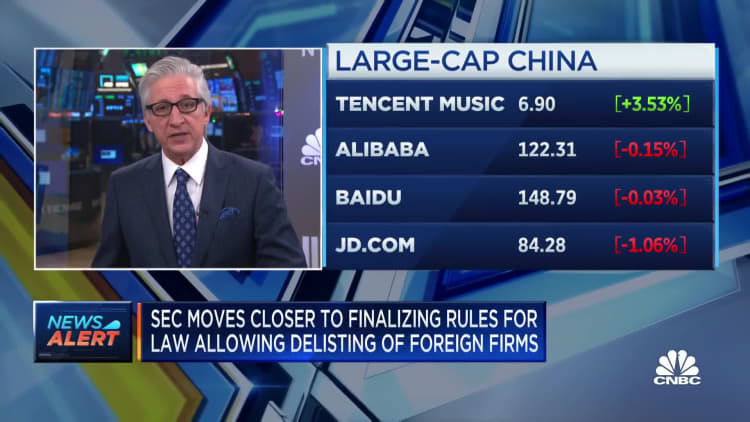
Foreign public companies that are listed in the United States may be delisted if their auditors do not comply with requests for information from U.S. regulators.
On Thursday, the Securities and Exchange Commission adopted amendments to finalize rules to implement the Holding Foreign Companies Accountable Act (HFCAA). The law was passed in 2020 after Chinese regulators repeatedly denied requests from the Public Company Accounting Oversight Board (PCAOB), which was created in 2002 to oversee the audits of public companies, to inspect the audits of Chinese firms that list and trade in the United States.
In 2020, Chinese firm Luckin Coffee fired its CEO and chief operating officer following an internal fraud probe, which increased calls for action.
The law permits the SEC to ban companies from trading and be delisted from exchanges if the PCAOB is not able to audit requested reports for three consecutive years. It also requires companies to declare whether they are owned or controlled by any foreign government.
The rules adopted on Thursday establish a framework for the law's implementation.
"We have a basic bargain in our securities regime, which came out of Congress on a bipartisan basis under the Sarbanes-Oxley Act of 2002. If you want to issue public securities in the U.S., the firms that audit your books have to be subject to inspection by the PCAOB," SEC Chair Gary Gensler said in a statement.
Gensler noted that while more than 50 foreign jurisdictions have worked with the PCAOB to allow inspections, "two historically have not: China and Hong Kong."
"This final rule furthers the mandate that Congress laid out and gets to the heart of the SEC's mission to protect investors," Gensler noted.
The finalized rules will allow investors to identify foreign companies that are listed in the U.S. that are not allowing the PCAOB to inspect their audits.
"This is a tough situation, because the companies are being held hostage," Brendan Ahern, chief investment officer of KraneShares, which runs several China-focused ETFs, including the KraneShares China Internet ETF, told me.
"It's the Chinese regulators who are preventing the U.S. regulators from inspecting the audits," Ahern said. "The issue unfortunately has been politicized. These companies are all audited by the Big Four accounting firms, but under Chinese law regulators are not allowing those audits to be sent to the PCAOB."
"What you have is Chinese law clashing with U.S. law," he said. "This needs to be dealt with above the regulator level, perhaps at the trade representative level."
"The losers are investors in these stocks, which are U.S. investors," Ahern added.
He noted that some Chinese companies that list in the U.S. are already relisting in Hong Kong.


